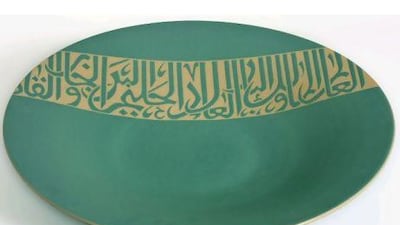Forgive the cliche, but more often than not, beauty resides in simplicity. Proof can be found in one of Jordan's most iconic contemporary shops, Silsal. The name translates to "clay" in Arabic - a choice akin to labelling a bakery "cake" or a department store "fabric" - and purity of design is the focus at the ceramics and furniture shop.
Inside this atelier's gallery in Jabal Amman is the stunning collection of ceramic designs that gave the shop its name: vases, bowls, plates, trays, teacups, coffee mugs, lamps and more testify to the myriad ways in which clay can be shaped. There is also a new line of furniture and accessories.
At the rear of the gallery, Samar Habayeb, Silsal's director and chief designer, is inspecting a new batch of pieces. Producing each piece requires 25 people working in tandem during seven stages over two months. All work takes place on site, and whenever possible, all materials are local - even the glazes are homemade. Samar inspects every piece before it leaves the workshop, scrutinising the composition and the details of the design.
"Take these four but not this one - look at the crack there," she tells an assistant. "It's one of the worst parts about making ceramics by hand," she explains. "After we put the pieces into the kiln, there's nothing we can do if there's a mistake."
Samar's mother and aunt, Reem and Rula Atalla, started the business when Samar was barely five years old, and she's grown up with the shop.
"There was no workshop and no staff when we first opened, just my aunt Rula and mother using a small potter's wheel and kiln in my aunt's basement," she recalls. The sisters' goal of preserving traditional ceramic craft came hand in hand with developing the country and offering gainful employment. Soon, the handmade crafts became popular with both Ammanis and tourists visiting Jordan.
Eighteen years in, the business had earned Silsal a sterling reputation in Jordanian society, and had become the go-to gift shop for individuals, families, foreign embassies and corporations. But for the founding sisters, sustaining the business, serving customers, and dealing with all those chipped plates and imperfect glazes just became too much.
"My mother and my aunt told the rest of our family, 'It's been 18 years. We've had great success but we've never made a profit and both of us want to retire,'" explains Samar, who at the time was completing an architecture degree. "I had these plans in place, but when my mother offered the job, I couldn't resist the challenge." She quickly changed gears, enrolling in a ceramics programme at Cardiff University in the UK, and returned to Amman to take the helm of Silsal.
Four years later, the 27-year-old designer has already made a deep impression. Last winter, she took Silsal into the furnishings arena, designing a diverse line of tables, stools and chairs whose common thread is simplicity of form, experimentation with materials, and homage to Silsal's signature ceramic motifs. Samar printed Arabic calligraphy onto a steel tripod stool, for example, and set a pastiche of ceramic Arabic letters directly into the wood of a side table. "The point at which two materials meet is so very important," she says, before explaining that setting Arabic letters into wood requires tracing, then carving out the exact position for the piece. Some tables have as many as 100 letters. The commitment to quality and beauty, however, is the priority, and Silsal's reputation for this accounts for the high demand for custom tables, chairs and, of course, ceramics.
In ceramics, Silsal's bread and butter, Samar has also given the atelier new directions. She maintained the traditional motifs such as Kufi Arabic calligraphy and a circular design inspired by an 11th-century Samarkand plate, but the catalogue is wider and cooler. On the rims of bowls, plates and trays, she has encouraged experimentation with block calligraphy, with the edge carved to correspond with the curves and notches of the Arabic script. Many bowls, cups and vases also feature a retro floral print, evocative of 1960s wallpaper patterns, and the modernist influence is increasingly apparent.
The unique blend of Arabic and modern aesthetics in such a bespoke style is earning Silsal wider recognition - and demand - beyond Jordan. Last month, Samar began selling Silsal's furniture at Kuwait's BTZ Gallery, which also sells Silsal ceramics. Silsal will also be present at the next edition of Maison et Objet, the premier biannual design expo in Paris. In addition, the shop's online store is attracting customers from around the world.
While her vision for the company includes further global expansion, the integrity and craftsmanship at the heart of Silsal remain immovable. "When people think of modern Arabic ceramics and design, I want them to think of Silsal," she says. "But I also want them to think of Jordan and the people of Jordan who make each piece."
Silsal products can be shipped to the UAE (price includes insurance) via the online store at www.silsal.com

